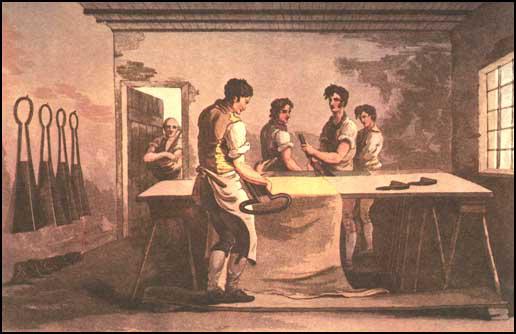Cloth Dressers
Cloth-dressers (croppers) were workers in the woollen industry who had the task of cutting the cloth after it had been in the fulling mill. The cropper's skill was to cut the surface of the cloth after it had been raised with shears. These shears weighed 40 lb (18 kg) and were 4 feet (1.2 km) long. Croppers were well paid and resisted attempts by their employers to introduce the shearing frame at the beginning of the 19th century.
Croppers became part of the Luddite movement that destroyed shearing frames in Yorkshire in 1812. Over 4,000 soldiers were brought in to keep order. After arrests and public hangings, including 17 men in York, the resistance came to an end. By the 1820s few croppers could find work in the woollen industry.

Primary Sources
(1) Committee of the Woollen Trade (1806)
The business of a cloth worker is to take a piece of cloth in its rough state as it comes from the market, or as it comes from the fulling mill; he first raises that cloth; after that, if it is a good piece, it is cropped wet; it is then taken and mossed and rowed; mossing is filling up the bottom of the wool after it has been cut with the shears wet, it is done with a handle set with teazles in each hand; after that it is rowed and tentered and dried; if a fine piece it will receive three cuts.
(2) George Walker, The Costume of Yorkshire (1815)
The cloth is placed upon the shear board, which is a sort of long narrow table, and he proceeds to clip the wool. The handle of the shears is supported by one hand, whilst with the other he works them by means of a small lever, called a gig, affixed to the upper edge.
An able workman will earn great wages, and, if industrious and steady, is certain to make his way in the world. The majority are idle and dissolute, owing perhaps partly to the laborious nature of their occupation, which too often induces habits of drunkenness, and partly to their working in numbers together, a circumstance always injurious to morals. To the unsteady conduct of the Croppers, by which in times of urgent business much loss and inconvenience were suffered by their employers, and from the great improvements lately made in mechanics, may be attributed the invention of the gig mills and shearing frames.
The establishment of these mills excited considerable alarm amongst the Croppers, and was the alleged cause of the late unhappy disturbances. By the active vigilance of the magistrates, the prompt execution of some of the ringleaders, and the well-timed lenity shown to others, tranquillity is now restored, and there no longer appears any disposition to outrage or even dissatisfaction.
